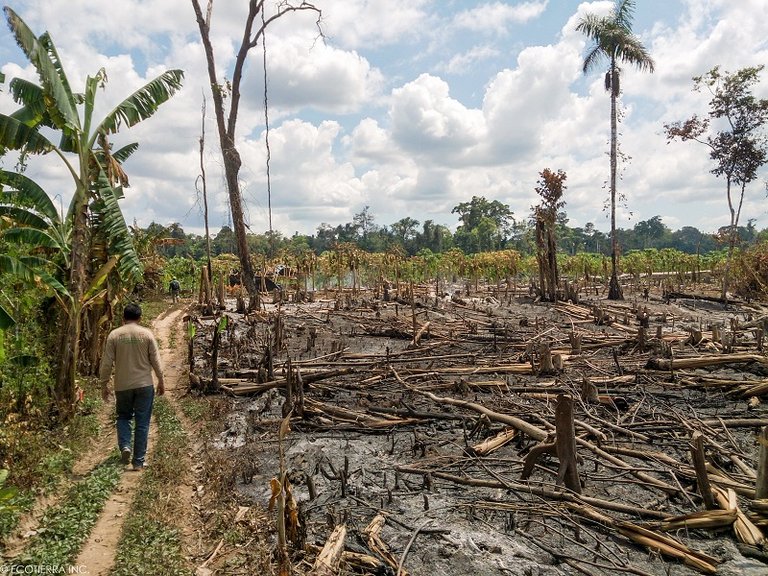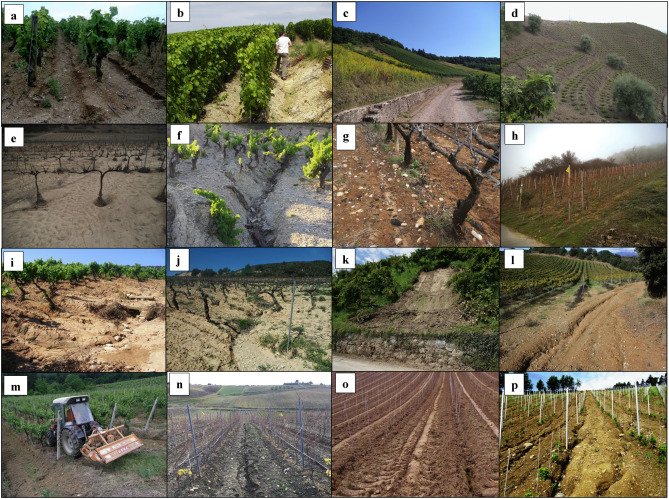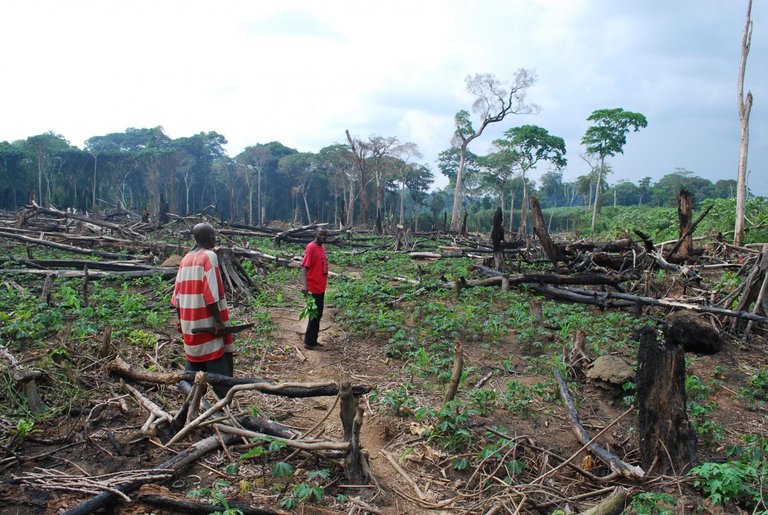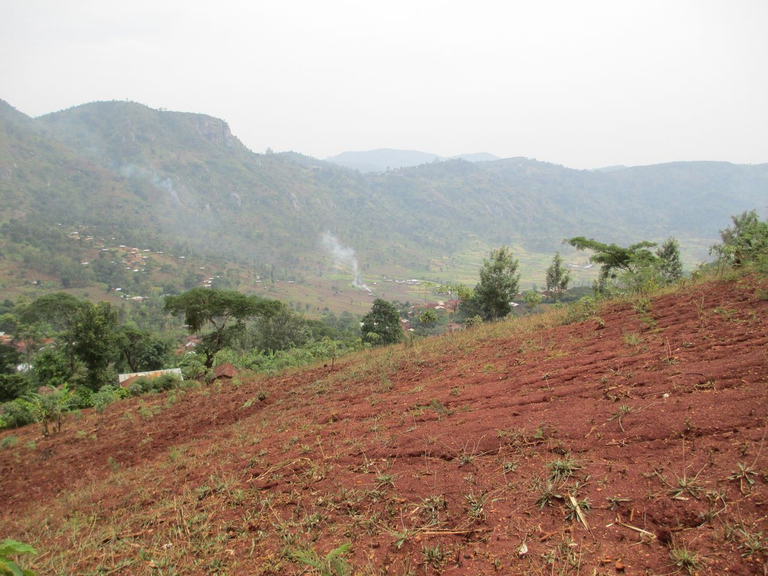
Slash and Burn in Agriculture is the process of cutting down trees and shrubs in the field in preparation for farming. After clearing the field, the foliage is burnt and the ashes in turn are meant to provide nutrients for the plants.
This practice is associated with shifting cultivation techniques which is widely practice in sub-saharan Africa and most third world and developing countries where subsistence agriculture is widely practiced.
In Nigeria where farming is mostly subsistence, shifting cultivation is widely practiced; hence, slash and burn agriculture is common practice. There is the advantage of large forest areas with small populations which makes it possible for the soil to recover before repeating the cycle of slash and burn.
However, there are places where the reverese is the case, where there is pressure on the land with massive populations on contrained land spaces. in this kind of places, the environmental impact of slash and burn agriculture is very devastating.

Environmental Impact of Slash and Burn
Sometimes Slash and burn agriculture is usually labeled as environmentally destructive, but it may be workable when practiced by small populations in large forests, where fields have sufficient time to recover before again being slashed, burned, and cultivated.
In the process of slashing and burning the field, there are impacts on the soil and its components resulting in drastic changes in the ecology and biodiversity of the soil.
These changes are not limited to the following;
- Soil erosion
- Deforestation
- Loss of Biodiversity
- Nutrient Loss

1. SOIL EROSION
Soil erosion is the displacement of the upper layer of soil, one form of soil degradation. This natural process is caused by the dynamic activity of erosive agents, that is, water, ice (glaciers), snow, air (wind), plants, animals, and humans.
In accordance with these agents, erosion is sometimes divided into water erosion, glacial erosion, snow erosion, wind (aeolean) erosion, zoogenic erosion, and anthropogenic erosion.
Soil erosion may be a slow process that continues relatively unnoticed, or it may occur at an alarming rate causing a serious loss of topsoil.
The loss of soil from farmland may be reflected in reduced crop production potential, lower surface water quality and damaged drainage networks.
The practice of slash and burn weaken the natural soil characteristic properties that ordinarily will help it to resist erosion either by run-off or wind.


2. DEFORESTATION
Deforestation occurs for multiple reasons: trees are cut down to be used for building or sold as fuel (sometimes in the form of charcoal or timber), while cleared land is used as pasture for livestock and plantation.
The removal of trees through slash and burn without sufficient reforestation has resulted in habitat damage, biodiversity loss, and aridity. It has adverse impacts on biosequestration of atmospheric carbon dioxide.


3. LOSS OF BIODIVERSITY
Continual slash and burn activities on farmers, if unchecked leads to Loss of biodiversity or biodiversity loss is the extinction of species (human, plant or animal) worldwide, and also the local reduction or loss of species in a certain habitat.
The latter phenomenon can be temporary or permanent, depending on whether the environmental degradation that leads to the loss is reversible through ecological restoration / ecological resilience or effectively permanent (e.g. through land loss). Global extinction has so far been proven to be irreversible.


4. NUTRIENTS LOSS
Nutrients can be lost in a number of ways. Soluble nutrients like nitrate and potassium can be lost in runoff and drainage water, whereas less soluble nutrients like phosphorus are more likely to be lost with sediments moving in eroding soils and run-off water.
Nitrogen can be lost by denitrification processes in soils that are saturated. Soils with high clay contents or in poor physical condition are slower draining and more likely to become saturated and anaerobic.
During the act of burning the foliage, the soil temperature is relatively increased; thus, the amount of nitrogen lost by denitrification depends on how long the soils are saturated and the soil temperature. When the temperature is between 13-16◦C losses are about 2% / day. As the soil warms losses increase to 5% /day [4].


In a bid to forsall, the environmental impact of this agricultural practice, in the sub-saharan Africa, especially Nigeria there has to be a concerted effort on the part of the government, non-governmental organisations, donor agencies and the farmers to;
- Educate the farmers on the dangers of the harmful traditional slash and burn practices
- Provide grants and loans for farming beyond subsistence farming
- Need for @steemchurch @farms to sensitize the @steemit community to embrace modern farming techniques in other to save and sustain our biodiversity

REFERENCES
[1] Soil Erosion
[2] Deforestation
[3] Loss of Biodiversity
[4] Nutrient loss
Thanks for sharing this wouderful publication, Slash and Burn has been a major factor limiting the growth in agricultural sector... in other to stop this we all must do our part, by educating other on the various farming methods.
Create a seminar to enlightens farmer's and the best agricultural practice.
Resteem
(to be a part of this community; ensure to always use #farms and #steemchurch for agricultural related post)
I am glad to be a member of this great family, where we are committed to feeding the soul via @steemchurch and feeding the body via @farms.
Logging operations, which provide the world’s wood and paper products, also cut countless trees each year. Loggers, some of them acting illegally, also build roads to access more and more remote forests—which leads to further deforestation. Forests are also cut as a result of growing urban sprawl as land is developed for dwellings.
Not all deforestation is intentional. Some is caused by a combination of human and natural factors like wildfires and subsequent overgrazing, which may prevent the growth of young trees.

Yes, logging when strategically planned and excuted can be sustainable, but as you rightly identified most operations are illegal.
However, through education and support, we can get the illegal loggers to adopt sustainable logging practices.
On the natural disasters, we could adopt afforestation strategies to combat the identified deforestation agents. Thanks @izuchukwu1506
Logging errands, which give the world's wood and paper things, similarly cut endless trees each year. Loggers, some of them acting illegally, moreover develop avenues to get to progressively remote timberlands—which prompts help deforestation. Timberlands are in like manner cut due to creating urban sprawl as land is made for living arrangements.
Well said, but the efforts needs to be intensified to encourage afforestation.
Rightly Said Brother, Deforestation Is The Major Problem Nowadays And Telling About This Problem To People Is A Great Work To Do.
Really Appreciate Your Words @moize
We keep doing it. Can't give up, until our devastated lands are restored. Thanks @zaviyar for your thoughts.
Thanks for this.
I know of deforestation as one of the problems in our environment, we want what the nature will give us but we are not ready to give back to nature.
If afforestation is really practice,things could have been better.
On point, but afforestation can work if we have the political will to pursue it. Thanks @funkylove for your thoughts.
Wow what a wonderful write up. Thanks for educating us about the effext of bush burning. Indeed bish burning is an environment hazard that causes the soil to loss its nutrients. It always kills the organism that ought to give the plants the neceßary nutirnts.

Thanks for sharing.
Bush burning of any type is unacceptable. It unbalances the biodivetsity of the soil ecosystem.
Thanks @femiandrew. Its nice having you.
A debt of gratitude is in order for sharing this wouderful distribution, Slash and Burn has been a central point restricting the development in horticultural division... in other to stop this we as a whole should do our part, by teaching other on the different cultivating strategies.
Wow what a superb review. Much obliged for teaching us about the effext of hedge consuming. For sure bish consuming is a situation risk that makes the dirt misfortune its supplements. It generally executes the life form that should give the plants the neceßary nutirnts.
@shahashah, education on the dangers of slash and burn is absolutely necessary and cannot be over emphasized.
Its dangers to the biodiversity and ecosystem cannot be over looked either.
Let us go out there and educate farmers.
A debt of gratitude is in order for this.
I am aware of deforestation as one of the issues in our condition, we need what the nature will give us however we are not prepared to offer back to nature.
On the off chance that afforestation is truly practice,things could have been something more.
Sure, afforestation is the key to combating deforestation.
We need to evolve strategies to encourage afforestation as the tress are being logged.
However, slash and burn should be discouraged completely.
Logging tasks, which give the world's wood and paper items, likewise cut incalculable trees every year. Lumberjacks, some of them acting illicitly, additionally construct streets to get to increasingly remote timberlands—which prompts assist deforestation. Timberlands are likewise cut because of developing urban sprawl as land is created for residences.
No doubt there are attendant benefits of logging as you mentioned.
It is important that, green areas/belts are created and strategies evolved to replace tress or create new plantations.